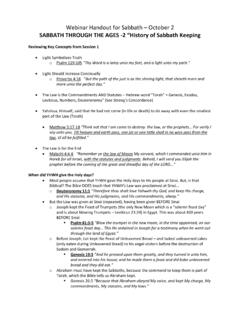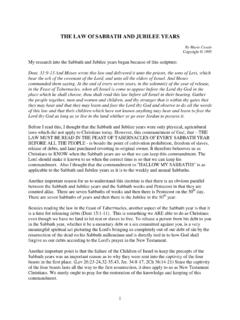Transcription of IS SUNDAY THE ORTHODOX CHRISTIAN SABBATH?
1 IS SUNDAY THE ORTHODOX CHRISTIAN sabbath ? Liturgical Theology 342 The Church Year and Its Hymnography Dr. Paul Meyendorff Fall 1999. Some of the free religious literature that is published by the Seventh Day Adventists condemns all Christians who worship on SUNDAY for not observing the sabbath as commanded by God. They cite the fourth commandment which states, Remember the sabbath day, to keep it holy (Ex. 20:8, RSV). The questions that arise for us are, 'Are we ORTHODOX observing this commandment correctly?' and 'Is SUNDAY really the ORTHODOX CHRISTIAN sabbath ?' It is the purpose of this essay to answer the last question with a definite 'No', and to give the reasons why. In the book of Exodus (Ex. 20:9-11), the sabbath is to be a day free of labor. One works for six days, but rests on the seventh. This ideology is derived from the Genesis creation accounts in which God labored for six days in creating the cosmos, then rested on and hallowed the seventh day.
2 The sabbath is a day of rest which becomes a 'palace in time', full of For the pious Jew, observance of the sabbath is not just bodily rest, but also allows one 'to celebrate the creation of the world and to create the seventh day all over again'.2 It is the day when man is given the opportunity to 'sanctify time' and to dedicate himself to Thus, the sabbath is not a day of idleness. Rather, it is intended to be a day of God-centered rest in which a person is freed from work and job responsibilities in order to focus on God and fellow human beings. For this reason, the sabbath is dedicated to biblical studies, prayer, meditation, and acts of mercy - being properly understood as a 'holy day' and not as a 'holiday'.4. When Jesus came, he brought with him some radical sabbath reforms. He reminded His opponents that the sabbath was made for man, not man for the sabbath .
3 (Mk. 2:27). Christ did not simply intend to annul the sabbath , but enriched its meaning 1. Heschel, A., The sabbath : Its Meaning for Modern Man (New York: Scribener 1954), p. 15. 2. Ibid, pg. 20. 3. Ibid, pg. 75. 4. Bacchiocchi, S., From sabbath to SUNDAY : An Historical Investigation of the Rise of SUNDAY Observance in Early Christianity (Rome: Pontifical Gregorian University Press 1977), pp. 319-321. and function by fulfilling its Messianic Jesus acted on the sabbath to counter the juridical understanding of the sabbath and return it to its original understanding as a day to commemorate the divine blessings of salvation, especially by expressing kindness and mercy toward others. 6 In doing this, Jesus identified His ministry with that of the temple priests whose sabbath work was allowed because of its redemptive With the advent of Christianity, the notions developed of freedom from the observance of the Judaic Law and of a day that existed outside time.
4 St Paul mentions in his writings that Gentile converts are not subject in any way to the keeping of the Law (cf. Letter to the Galatians, etc.), which would include the keeping of the sabbath as the day of corporate worship. It is generally known that the early Christians did gather on SUNDAY to commemorate the resurrection of Jesus Christ. The late first- to early second- century document known as the Epistle of Barnabas confirms this when it states that .. we spend the eighth day in celebration, the day on which Jesus both arose from the dead and, after appearing again, ascended into heaven. 8 This reflects the notion inherent in early Christianity that SUNDAY was the eschatological eighth day spoken of in Jewish apocalyptic literature. Thus, SUNDAY is somehow understood within an eschatological, not sabbatical, framework. This is the key to understanding SUNDAY / sabbath , to which we shall return later, after investigating how SUNDAY CHRISTIAN worship became erroneously identified as the CHRISTIAN sabbath .
5 SUNDAY worship was a problem for Christians in the first three centuries. There was no official recognition of Christianity; in fact, to be a CHRISTIAN was a crime punishable by death. So it is unrealistic to think that the earliest Christians took the day off on SUNDAY , an official work day in the Roman Empire, thereby making themselves easily recognizable. It appears that SUNDAY worship took place secretly very early on SUNDAY morning, before the work day began, or in some cases immediately after supper, a social gathering time for Romans. 5. Ibid, pg. 304. 6. Ibid, pg. 304. 7. Ibid, pg. 304. 8. Epistle of Barnabas, 20:9, in The Apostolic Fathers: Greek Texts and English Translatiosn, revised and edited by Michael W. Holmes (Grand Rapids, MI: Baker Books, 1999), pg. 317. Emphasis mine. Later on, it is evident that some early Christians did observe at least a partial day free from the regular routines of life.
6 In Chapter 13 of the Syriac Didascalia Apostolorum, written in the mid-third century, it states that what was required was not total rest from work but instead partial rest from work for the purpose of gathering to worship. The text specifies that on the Lord's Day one is to leave everything and run eagerly to your church .9 Further in the text, it states that whenever you are not in the church, devote yourselves to your work; so that in all the conduct of your life you may either be occupied by the things to the Lord or engaged upon your work, and may never be idle. 10 SUNDAY was a day to put off business affairs for a short time and was not apparently understood as a holy day of rest like the sabbath . This appears, according to Rordorf, to be the Church's way of guarding against sloth, which would give the devil ample opportunity to The SUNDAY / sabbath notion really began to be confused with the Emperor Constantine.
7 On March 3, 321 , the emperor decreed that all workers (except farmers) should rest on the honourable day of the sun . Constantine was at that time in favour of sun-worship and the military cult of the god Mithras. It may be that this decree was his own attempt to unite the empire under a sun-religion and devote the first day of the seven-day week to this deity. Despite the best attempts to Christianize this imperial decree, it is highly doubtful that Constantine was influenced by CHRISTIAN With this decree, the Church was now faced with the problem of making SUNDAY , rather than the original sabbath , a day of rest. As time went on, the notion of a SUNDAY rest day grew. Emperor Theodosius, the first truly CHRISTIAN emperor, re-issued Constantine's decree in a fully CHRISTIAN form. He even moved the celebration of the SUNDAY Eucharist to mid-morning.
8 St. Augustine, invoking the Ten Commandments, declared that the Christians must have a CHRISTIAN . sabbath day of rest. Ultimately, the Church added the notion of the sabbath to the imperial regulation of SUNDAY as a day of rest, and ended up giving a theological 9. Didascalia Apostolorum: The Syriac Version Translated and Accompanied by the Verona Latin Fragments, transl. by R. Hugh Connolly (Oxford: Clarendon Press, 1929), p. 124. 10. Ibid, pg. 128-9. 11. Rordorf, W., SUNDAY : The History of the Day of Rest and Worship in the Earliest Centuries of the CHRISTIAN Church (Philadelphia: Westminster Press, 1968), pp. 158-161. 12. Ibid, pg. 163-4. definition to the State-legislated day off .13 This concept finally evolved through the centuries to its final form in the Puritan movement that made SUNDAY the CHRISTIAN sabbath and banned work as well as dancing and any other sort of debauchery.
9 This idea, though incorrect, is the understanding even among many ORTHODOX Christians today. What, then, is the true understanding of the gathering on SUNDAY for worship? Three key points must be addressed: (1) the Resurrection, (2) the Eucharist, and (3) the theology of the eschatological Eighth Day. First, the Church has always understood SUNDAY as the day of Resurrection. The empty tomb of Jesus was discovered on the first day of the week after the sabbath was over (Mk. 16:1-2, Lk. 23:56b-24:l, Mt. 28:1). The significance of gathering on this day was to commemorate and confess the Resurrection of Christ. It is also important to note that before the Resurrection came a day of rest for Christ. After His death on the Cross, after he had completed all of His salvific work within the limits of our time, the Lord rested. He had His own Saturday Nowhere is this concept more apparent than in the hymnology of the services of Holy Week, where the Church declares that Christ's rest in the tomb was the fulfillment of the sabbath .
10 For example, the fourth ode of the canon of Holy Friday Evening, which is really the service for Saturday morning, states, [t]hou hast blessed, O Saviour, this seventh day, which thou hadst blessed at the beginning with rest from work; for thou hast brought out everything, renewing and restoring it to its former state, thus keeping the sabbath . 15 In that same service the following hymn is also sung: [t]he great Moses foreshadowed this day mystically by his saying, And God blessed the seventh day'; for this is the day of quiet and rest, on which the only Son of God rested from all His works, keeping sabbath in the body. 16 This hymn is repeated again at the Vesperal Divine Liturgy on Holy Saturday Thus, even the hymnography of the Church declares Saturday as the sabbath . SUNDAY is the day of the Resurrection. 13. Ibid., p. 168. 14. Bradshaw, P.






